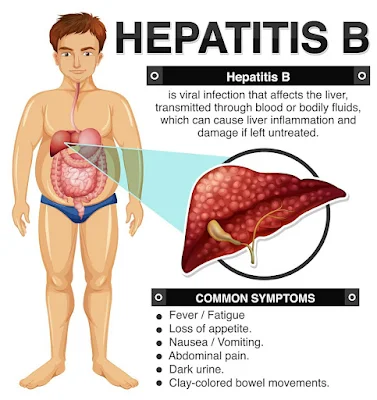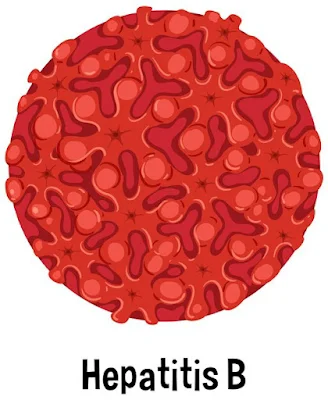Hepatitis B, a viral infection that affects millions worldwide, has long been a puzzling medical challenge. With its chronic nature and potential for severe liver damage, finding a cure has been an elusive quest for scientists and researchers. However, recent advancements in medical technology and a deeper understanding of the virus have sparked hope in the medical community. In this article, we dive into the intricate world of Hepatitis B, exploring the latest breakthroughs, treatment options, and the burning question on everyone's mind - can Hepatitis B be cured?
 |
| Image credit goes to Freepik |
Understanding Hepatitis B
Hepatitis B is a viral infection that primarily affects the liver. It is transmitted through contact with infected blood or bodily fluids, such as during unprotected sex, sharing needles, or from an infected mother to her baby during childbirth. The virus can survive outside the body for up to seven days, making it highly contagious. Once infected, individuals may experience symptoms such as fatigue, jaundice, abdominal pain, and loss of appetite. Hepatitis B can be categorized as acute or chronic, with chronic cases being more prevalent and posing a greater long-term health risk.
Hepatitis B is caused by the hepatitis B virus (HBV), which attacks the liver cells and triggers an immune response. The immune response, in turn, leads to inflammation and damage to the liver. In acute cases, the immune system is usually able to eliminate the virus within six months. However, in chronic cases, the virus persists in the body for longer periods, increasing the risk of liver cirrhosis, liver failure, and liver cancer.
The Progression of Hepatitis B
The progression of Hepatitis B varies from person to person. Some individuals may remain asymptomatic for years or even decades, while others may experience a rapid decline in liver function. The virus can be classified into four phases: the incubation period, the acute phase, the chronic phase, and the inactive carrier state.
 |
| Image credit goes to Freepik |
During the incubation period, which typically lasts for one to six months, an infected individual may not experience any symptoms. However, the virus is actively replicating within the body, increasing the risk of transmission to others.
The acute phase of Hepatitis B is characterized by the onset of symptoms such as fever, fatigue, nausea, and jaundice. This phase may last for several weeks or months, and during this time, the immune system is actively fighting the virus.
In chronic cases, the infection persists beyond six months. While some individuals may remain asymptomatic, others may experience ongoing liver inflammation, leading to liver damage, cirrhosis, and an increased risk of liver cancer.
In the inactive carrier state, the virus is still present in the body, but liver inflammation is minimal or absent. However, even in this state, there is still a risk of reactivation and progression to active infection.
Treatment Options for Hepatitis B
The treatment options for Hepatitis B depend on various factors, including the phase of the infection, the severity of liver damage, and the presence of other underlying medical conditions. The primary goal of treatment is to suppress viral replication, reduce liver inflammation, and prevent complications.
Antiviral therapy is the cornerstone of Hepatitis B treatment. These medications target the replication of the virus, slowing down its progression and reducing the risk of liver damage. Commonly prescribed antiviral drugs include entecavir, tenofovir, and interferon alpha. These medications are typically taken orally and require regular monitoring to assess their effectiveness.
In addition to antiviral therapy, lifestyle modifications play a crucial role in managing Hepatitis B. It is essential to avoid alcohol, as it can further damage the liver. A healthy diet, regular exercise, and adequate rest are also important in supporting overall liver health and immune function.
Can Hepatitis B be cured?
The burning question on everyone's mind is whether Hepatitis B can be cured. While there is currently no known cure for Hepatitis B, significant progress has been made in managing the infection and improving long-term outcomes.
Antiviral therapy has been shown to effectively suppress viral replication and reduce liver inflammation. With long-term treatment, some individuals may achieve a state called "virological remission," where the virus becomes undetectable in the blood. However, it is important to note that even in this state, the virus may still be present in other body tissues, and there is a risk of reactivation.
 |
| Image credit goes to Freepik |
Research efforts are focused on developing new antiviral drugs and combination therapies to enhance treatment outcomes. The goal is to find a cure that can completely eliminate the virus from the body and restore normal liver function. While this may still be a distant goal, the progress made thus far gives hope for a future where Hepatitis B can be eradicated.
Current research and advancements in Hepatitis B treatment
The field of Hepatitis B research is constantly evolving, with ongoing studies and clinical trials aimed at improving treatment options and finding a cure. One promising area of research is the development of new antiviral drugs that target specific steps in the viral replication process. These drugs have shown promising results in early trials, and further research is underway to assess their long-term efficacy and safety.
Another area of focus is the development of therapeutic vaccines for Hepatitis B. These vaccines aim to stimulate the immune system to recognize and eliminate the virus. While traditional Hepatitis B vaccines are preventive and used to protect individuals from acquiring the infection, therapeutic vaccines have the potential to enhance the immune response in individuals already infected. Several therapeutic vaccine candidates are currently being tested in clinical trials, and their success could revolutionize Hepatitis B treatment.
Managing Hepatitis B - lifestyle changes and prevention
While there is no cure for Hepatitis B, individuals can take steps to manage the infection and minimize the risk of complications. Lifestyle changes play a crucial role in supporting liver health and overall well-being.
Avoiding alcohol is essential, as it can worsen liver damage and interfere with the effectiveness of antiviral medications. It is also important to maintain a healthy diet rich in fruits, vegetables, and whole grains, while limiting the intake of processed foods and saturated fats.
 |
| Image credit goes to Freepik |
Regular exercise can help improve liver function and boost the immune system. Engaging in physical activities such as walking, swimming, or yoga can have a positive impact on overall health.
Prevention strategies are also vital in reducing the transmission of Hepatitis B. Vaccination is the most effective way to prevent Hepatitis B infection. The vaccine is typically administered as a series of three shots and provides long-term protection. It is recommended for all infants, children, and high-risk individuals, such as healthcare workers, individuals with multiple sexual partners, and those who use injectable drugs.
Support groups and resources for Hepatitis B patients
Living with Hepatitis B can be challenging, both physically and emotionally. Support groups and resources can provide a valuable network of support and information for individuals affected by the infection.
There are numerous organizations and online communities dedicated to raising awareness about Hepatitis B and providing support to patients and their families. These groups offer information on treatment options, lifestyle management, and emotional support. They also serve as platforms for patients to connect with others facing similar challenges, share experiences, and find solace in knowing they are not alone.
The importance of regular check-ups and monitoring
Regular check-ups and monitoring are crucial for individuals living with Hepatitis B. These visits allow healthcare providers to assess liver function, monitor the effectiveness of antiviral therapy, and detect any signs of disease progression or complications.
During these check-ups, blood tests are conducted to measure liver enzymes, viral load, and other markers of liver health. Imaging tests, such as ultrasound or MRI, may also be performed to assess the condition of the liver and detect any abnormalities.
 |
| Image credit goes to Freepik |
Early detection of liver damage or the reactivation of the virus can prompt timely interventions and prevent long-term complications. Therefore, it is essential for individuals with Hepatitis B to adhere to their healthcare provider's recommended monitoring schedule.
Conclusion
While the quest for a cure for Hepatitis B continues, significant progress has been made in understanding the virus, developing effective treatment options, and advancing preventive strategies. Antiviral therapy has proven to be a game-changer in managing Hepatitis B, allowing individuals to live healthier, more fulfilling lives. Ongoing research and clinical trials offer hope for a future where a cure for Hepatitis B becomes a reality. In the meantime, individuals affected by Hepatitis B can take steps to manage the infection, support liver health, and seek support from the numerous resources available. Together, we can unravel the mystery of Hepatitis B and work towards a future free from its grip.
Comments
Post a Comment